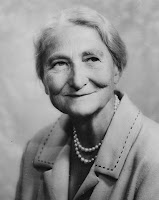Eileen Younghusband (1902-1981)
By Library of the London School of Economics and Political Science - originally posted to Flickr as Dame Eileen Younghusband, c1970s, Copyrighted free use, https://commons.wikimedia.org/w/index.php?curid=8622572
In numerous aspects, the social worker Eileen Younghusband (1902–1981) is a significant figure in the history of social work in the 20th century. She was involved during the welfare state's most crucial formative decades, making a substantial contribution to the establishment of institutions and mechanisms at the national level in the UK, particularly through committee work and reports. She published a few works on the history of social work in Britain toward the end of her career. According to some, this is the history of British social services without Eileen Younghusband. She was modest about her own contribution to the field of social work, but it was significant and it still serves as an example for modern practice.
Early Life
Her father worked as a colonial services officer in India, where she spent her childhood. She started the social work field in London at the age of 22 and quickly moved on to settlement work in the eastern London neighborhoods of Bermondsey and Stepney. As she studied sociology at the London School of Economics, her career as a staff member and the creator of an original generic social work course emerged. This course, which was introduced in 1954 and immediately became a model for other social work training programs.
Eileen Younghusband worked for Carnegie UK Trust
Eileen Younghusband chaired numerous committees throughout her career and contributed to numerous reports, some of which led to modifications in the field of social work. She produced papers on Social work in Britain and Employment and Training of Social Workers (1947) while working for the Carnegie UK Trust (1951). The Carnegie reports are those documents. She fervently argued for social work training that is centered around fundamental concepts shared by all social workers, regardless of their area of specialization. Later, she served as chair of the Committee on Social Workers in Local Authority Health and Welfare Services, which came up with ground-breaking suggestions on social work education and training. The committee's report, which later went under the name Younghusband, was released in 1959. It resulted in the creation of the National Institute of Social Work (NISW) in 1961, which for four decades served as an inspiration for social work both domestically and abroad. NISW became a part of the Social Care Institute of Excellence in 2003. (SCIE).
In addition, Eileen Younghusband participated in international affairs, first through the British Council and the UN and then, starting in 1950, through the International Association of Schools of Social Work (IASSW), first as a board member and then, starting in 1961, as (honorary) president. She assigned herself the job of advancing excellent standards of social work education globally. The IASSW continues to honor her with the yearly Eileen Younghusband memorial talks at its international conference.
On May 27, 1981, in Raleigh, North Carolina, Eileen Younghusband, 79, lost her life in an automobile accident while traveling across North America for a lecture tour.



Comments